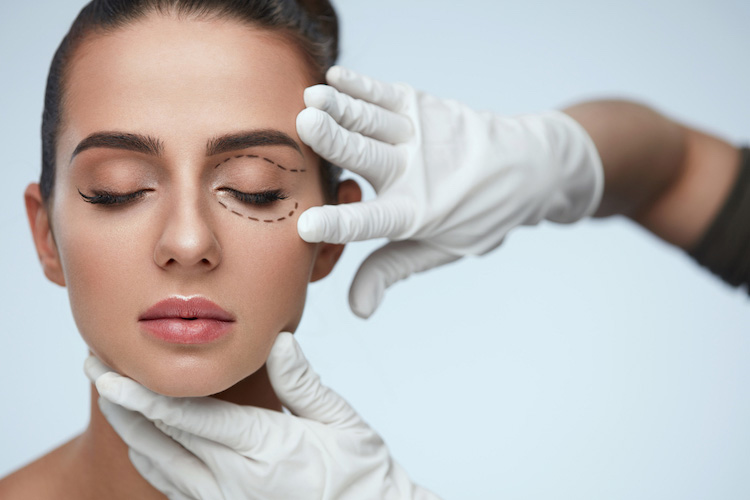What is Eyelid Surgery Recovery Like?
For the right patient, a blepharoplasty can provide significant benefits. The eyes are one of the most prominent and expressive features of the face so correcting issues — even if they are perceived only by the patient — can produce a dramatic improvement to the appearance of the entire facial area.
All surgeries have recovery, however, and this aspect of the procedure may affect an individual’s desire to have the surgery or not. If it is important to the patient to have a blepharoplasty, then understanding recovery thoroughly can help them be fully prepared for this phase, increasing their comfort, minimising complications and eliciting the result they expect. Understanding recovery from a blepharoplasty well can also alleviate unnecessary stress and give patients greater peace of mind.
What To Expect Immediately After Blepharoplasty
Whether you have your blepharoplasty as day surgery or as part of a hospital stay, most patients will have their recovery at home, though in rare instances patients may have part of their recovery in hospital. The particular needs of the surgery will dictate where a patient’s surgery will be performed.
Side effects that patients will experience immediately after their surgery will include redness and swelling around the incisions, symptoms common to all surgeries. The treated eyes may tear excessively during this time also; alternately, patients may experience dryer-than-normal eyes, which can be soothed through a doctor-prescribed ointment.
As is to be expected, all of these factors may temporarily affect the vision of the patient, and while this can be concerning for those who have just had surgery, these side effects are normal and pass quickly. Sensitivity to light is also a common and short-lived symptom of a blepharoplasty procedure.
The Process of Recovery from Blepharoplasty
The First Two Weeks
Recovery from a blepharoplasty consists of many stages during which side effects progressively lessen in severity and gradually disappear. Tightness of the skin where the incisions were made is a natural and expected part of recovery from any surgery. Your Specialist Plastic Surgeon will likely recommend an ointment to be applied to lessen their soreness and increase your comfort.
Swelling is another side effect common to all surgeries and one to expect after blepharoplasty. Swelling can be reduced through the use of cold compress and by keeping the head elevated as much as possible immediately after surgery. Patients who experience dry eyes can relieve their symptoms with eye drops which your surgeon will provide you. Ointments can alleviate the tightness and soreness of skin near the incisions.
For the first few days after a blepharoplasty, patients should avoid any activities which will unnecessarily strain the eyes. These activities include reading, whether in print or on a computer screen, long periods of watching television or the use of contact lenses. This phase of recovery usually only lasts a week.
Bruising and swelling which can be uncomfortable and unsightly can be reduced by keeping the head elevated as much as possible during early recovery. Once the Specialist Plastic Surgeon removes the stitches from the incisions, many patients will feel comfortable resuming social visits and even going back to work. This usually occurs around 10 days after surgery.
After The First Two Weeks
Sunglasses are frequently recommended during the first two to four weeks after surgery as they help protect the eyes from debris and from excessive sun which could discolour the sensitive skin of the incisions; sunglasses can also decrease the incidence of pain and possible discolouration. It is natural for a patient’s eyes to fatigue easily during the early weeks of recovery. This side effect can be accommodated by resting the eyes frequently.
Vigorous activities should be avoided as much as possible because they can increase blood flow to the treated area, compromising the healing of the incisions. Delay resuming activities such as bending or lifting, working out and sports. If possible, also avoid crying. Patients should consult their performing Specialist Plastic Surgeon before fully returning to their normal routines.
How long will recovery take?
Among the most important factors to consider when planning your blepharoplasty is the amount of time required to recover safely and worry-free and ensure your results. Patients should understand it will take several weeks to recover fully from a blepharoplasty and that it will be necessary to make special preparations at home and adjust their schedule and lifestyle temporarily during this time.
Besides having their medications on-hand, caring for their incisions and allowing ample time for rest, many patients must also prepare for the emotional aspects of recovery. It is natural and common for most patients to experience mild to moderate depression immediately after surgery. This may occur for many reasons, including the pain of surgery and their temporary inability to perform formerly routine aspects of their day to day lives. These emotional side effects soon pass.
Schedule Your Free In-person Consult at Niche Plastic Surgery Now
Niche Plastic Surgery prioritises its patients’ experience and strives to ensure that every aspect of their visit — from consultation through aftercare — is exceptional and that their cosmetic goals are realised in comfort and safety.
The practice’s three principal Specialist Plastic Surgeons — Dr Ramakrishnan, Dr Burge and Dr Barton — have exceptional qualifications in plastic, reconstructive, craniofacial and cosmetic surgery and have created a welcoming environment for patients which emphasises communication so that their needs can be met.
Schedule your consultation with Niche Plastic Surgery by calling the practice on 03 9853 9705 or booking an appointment online. We look forward to helping you achieve your cosmetic goals.


